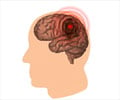Known as nature's most maligned creatures, the naked mole rats may hold vital clues to surviving stroke, say researchers.
The study led by two University of Illinois at Chicago researchers has shown that adult naked mole rat brain tissue can withstand extreme hypoxia, or oxygen deprivation, for periods exceeding a half-hour - much longer than brain tissue from other mammals.It may yield clues for better treatment of brain injuries associated with heart attack, stroke and accidents where the brain is starved of vital oxygen.
African naked mole rats live about six feet underground in big colonies of up to 300 members. The living is tight and the breathing even worse, with the limited air supply high in carbon dioxide and low in oxygen.
The air they breathe is so foul it would be fatal or lead to irreversible brain damage in any other mammal, said the researchers.
But they have been found to show systemic hypoxia adaptations, such as in the lungs and blood, as well as neuron adaptations that allow brain cells to function at oxygen and carbon dioxide levels that other mammals cannot tolerate.
"In the most extreme cases, naked mole rat neurons maintain function more than six times longer than mouse neurons after the onset of oxygen deprivation," said John Larson, associate professor of physiology in psychiatry.
Advertisement
Researcher Thomas Park believes that the extreme resistance to oxygen deprivation is a result of evolutionary adaptations for surviving in a chronically low-oxygen environment.
Advertisement
The study appears online in NeuroReport.
Source-ANI
TRI













